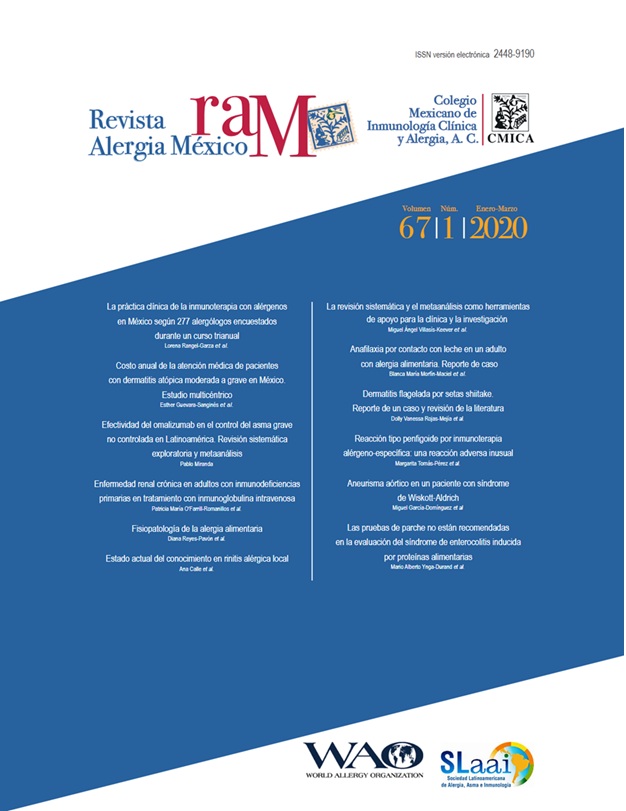Abstract
Background: There are different guidelines for the diagnosis of allergic diseases and the application of allergen immunotherapy (AIT).
Objective: To describe how Mexican allergists diagnose and treat respiratory and food allergies with AIT.
Methods: 227 allergists who attended an immunotherapy symposium were surveyed; the topics investigated were the daily practices in the diagnosis of respiratory and food allergies, as well as ways to apply AIT.
Results: The surveyed allergists use skin prick tests for the diagnosis of both respiratory and food allergies in 100 % and 87.7 % of their cases respectively; in vitro diagnosis through serum specific IgE in 55.5 % and 63 %, and molecular diagnostics in 14.1% and 13.2 %. For aeroallergens, 81 % prescribe subcutaneous AIT, 77.9 % use liquid sublingual AIT, and 1.8 % prefer SLIT in tablets; however, 45 % indicated that they would use tablets in the future. Regarding food allergens, most respondents did not prescribe AIT; however, 55% of them are interested in oral AIT and 59% of them are interested in sublingual AIT.
Conclusions: Generally, the diagnosis and treatment of allergic diseases are carried out according to international guidelines; besides, the interviewed allergists expressed flexibility to adopt new schemes.
References
Noon L. Prophylactic inoculation against hay fever. Int Arch Appl Immunol. 1953;4(4):285-288. DOI: 10.1159/000228032
Freeman J. Further observations of the treatment of hay fever by hypodermic inoculations of pollen vaccine. Lancet. 1911;2:814-817
Heinzerling L, Mari A, Bergmann KC, Bresciani M, Burbach G, Darsow U, et al. The skin prick test-European standards. Clin Transl Allergy. 2013;3(1):3. DOI: 10.1186/2045-7022-3-3
Cox L, Nelson H, Lockey R, Calabria C, Chacko T, Finegold I, et al. Allergen immunotherapy: a practice parameter third update. J Allergy Clin Immunol. 2011;127(Suppl1):S1-S55. DOI: 10.1016/j.jaci.2010.09.034
Bousquet J, Lockey R, Malling HJ. Allergen immunotherapy: therapeutic vaccines or allergic diseases. A WHO position paper. J Allergy Clin Immunol. 1998;102(4 Pt 1):558-562. DOI: 10.1016/s0091-6749(98)70271-4
Pedroza A, Becerril M. Consenso nacional de inmunoterapia. Rev Alerg Mex. 1998;45(Supl May).
Larenas-Linnemann D, Ortega-Martell JA, Del Río-Navarro B, Rodríguez-Pérez N, Arias-Cruz A, Estrada A, et al. Guía Mexicana de Práctica Clínica de Inmunoterapia 2011. Rev Alerg Mex. 2011;58(1):3-75. Disponible en: https://www.elsevier.es/es-revista-revista-alergia-mexico-336-articulo-guia-mexicana-practica-clinica-inmunoterapia-X0002515111209882
Larenas-Linnemann D, Luna Pech JA, Rodríguez-Pérez N, Rodríguez-González M, Arias-Cruz A, Blandón-Vijil MV, et al. GUIMIT 2019, Guía Mexicana de Inmunoterapia. Guía de diagnóstico de alergia mediada por IgE e inmunoterapia aplicando el método ADAPTE. Rev Alerg Mex. 2019;66(Supl 1):1-105. DOI: 10.29262/ram.v66i5.631
Frankland AW, Augustin R. Prophylaxis of summer hay-fever and asthma: a controlled trial comparing crude grass-pollen extracts with the isolated main protein component. Lancet. 1954;266(6821):1055-1057.
Amin HS, Liss GM, Bernstein DI. Evaluation of near-fatal reactions to allergen immunotherapy injections. J Allergy Clin Immunol. 2006;117(1):169-175. DOI: 10.1016/j.jaci.2005.10.010
Larenas-Linnemann D, Rodríguez-Pérez N, Becerril M. Adverse reactions to skin tests and immunotherapy in the practice of Mexican allergologists. Rev Alerg Mex. 2008;55(2):62-70.
González-Diaz S, de la Rosa-López JH, Arias Cruz A, Macías-Weinmann A, Herrera-Castro D, Rodríguez-Ortiz P, et al. Reacciones sistémicas relacionadas a la inmunoterapia con alérgenos en Monterrey, México. Rev Alerg Mex. 2011;58(2):79-86. Disponible en: https://www.elsevier.es/es-revista-revista-alergia-mexico-336-articulo-reacciones-sistemicas-relacionadas-inmunoterapia-con-X0002515111240634
Rodríguez-Pérez N, Ambriz-Moreno MJ, Pizarro-Esquivel U. Reacciones sistémicas no fatales por inmunoterapia y pruebas cutáneas. Rev Alergia Mex. 2002;49(3):69-73.
Larenas-Linnemann D, Luna-Pech JA, Mösges R. Debates in allergy medicine: allergy skin testing cannot be replaced by molecular diagnosis in the near future. World Allergy Organ J. 2017;10(1):32. DOI: 10.1186/s40413-017-0164-1
Bernstein IL, Li JT, Bernstein DI, Hamilton R, Spector SL, Tan R, et al. Allergy diagnostic testing: an updated practice parameter. Ann Allergy Asthma Immunol. 2008;100(3 Suppl 3):S1-S148. DOI: 10.1016/s1081-1206(10)60305-5
Lockey RF, Benedict LM, Turkeltaub PC, Bukantz SC. Fatalities from immunotherapy (IT) and skin testing (ST). J Allergy Clin Immunol. 1987;79(4):660-677. DOI: 10.1016/s0091-6749(87)80164-1
Wollenberg A, Vogel S. Patch testing for noncontact dermatitis: the atopy patch test for food and inhalants. Curr Allergy Asthma Rep. 2013;13(5):539-544. DOI: 10.1007/s11882-013-0368-6
Luo, Y, Zhang, GQ, Li, ZY. The diagnostic value of APT for food allergy in children: a systematic review and meta-analysis. Pediatr Allergy Immunol. 2019;30(4):1-11. DOI: 10.1111/pai.13031
Breiteneder H, Hassfeld W, Pettenburger K, Jarolim E, Breitenbach M, Rumpold H, et al. Isolation and characterization of messenger RNA from male inflorescences and pollen of the white birch (Betula verrucosa). Int Arch Allergy Appl Immunol. 1988;87(1):19-24. DOI: 10.1159/000234643
Canonica GW, Ansotegui IJ, Pawankar R, et al. A WAO-ARIA-GA²LEN consensus document on molecular-based allergy diagnostics. World Allergy Organ J. 2013;6(1):1-17. DOI: 10.1186/1939-4551-6-17
Becker S, Gröger M, Jakob T, Klimek L. The benefit of molecular diagnostics in allergic rhinitis. Allerg J Int. 2017;26(Suppl 23):301-310. DOI: 10.1007/s40629-017-0033-z
Mosbech H, Deckelmann R, de Blay F, Pastorello EA, Trebas-Pietras E, Malcus I, et al. Standardized quality (SQ) house dust mite sublingual immunotherapy tablet (ALK) reduces inhaled corticosteroid use while maintaining asthma control: A randomized, double-blind, placebo-controlled trial. J Allergy Clin Immunol. 2014;134(3):568-575. DOI: 10.1016/j.jaci.2014.03.019
Li Y, Yu SY, Tang R, Zhao ZT, Sun JL. Sublingual immunotherapy tablets relieve symptoms in adults with allergic rhinitis: a meta-analysis of randomized clinical trials. Chin Med J (Engl). 2018;131(21):2583-2588. DOI: 10.4103/0366-6999.244108
Martínez-Gómez JM, Johansen P, Erdmann I, Senti G, Crameri R, Kündig T. Intralymphatic injections as a new administration route for allergen-specific immunotherapy. Int Arch Allergy Immunol. 2009;150(1):59-65. DOI: 10.1159/000210381
Senti G, Kündig TM. Novel delivery routes for allergy immunotherapy: Intralymphatic, epicutaneous, and intradermal. Immunol Allergy Clin North Am. 2016;36(1):25-37. DOI: 10.1016/j.iac.2015.08.006
Sicherer SH, Sampson HA. Food allergy: epidemiology, pathogenesis, diagnosis, and treatment. J. Allergy Clin Immunol. 2014;133(2):291-307. DOI: 10.1016/j.jaci.2013.11.020

This work is licensed under a Creative Commons Attribution-NonCommercial 4.0 International License.
Copyright (c) 2020 Revista Alergia México

